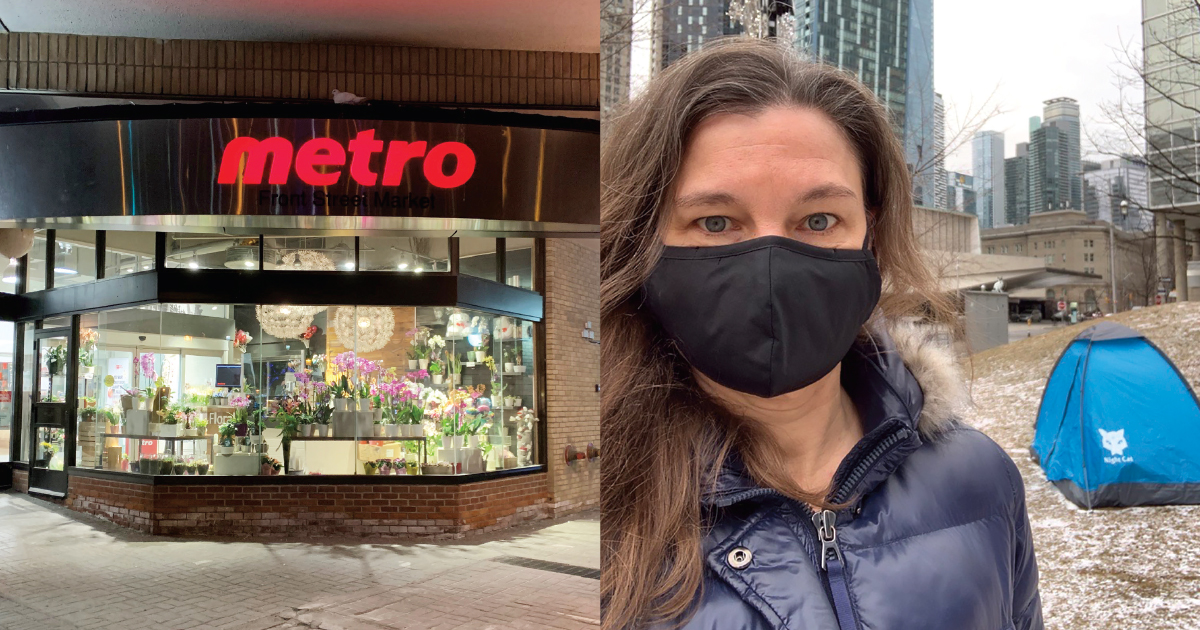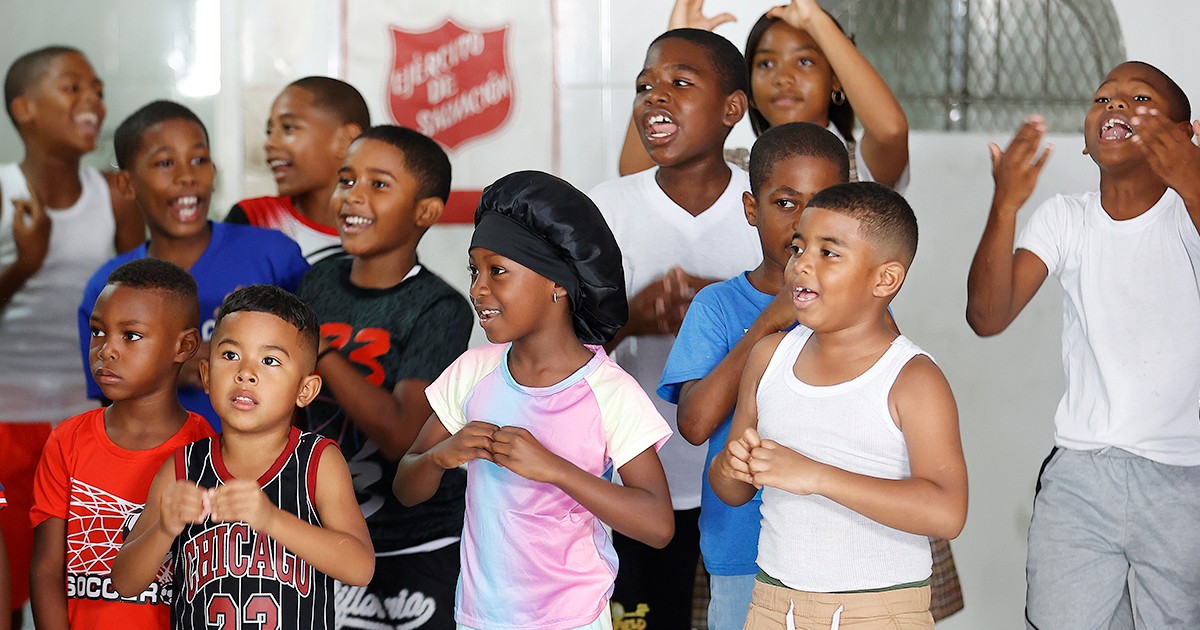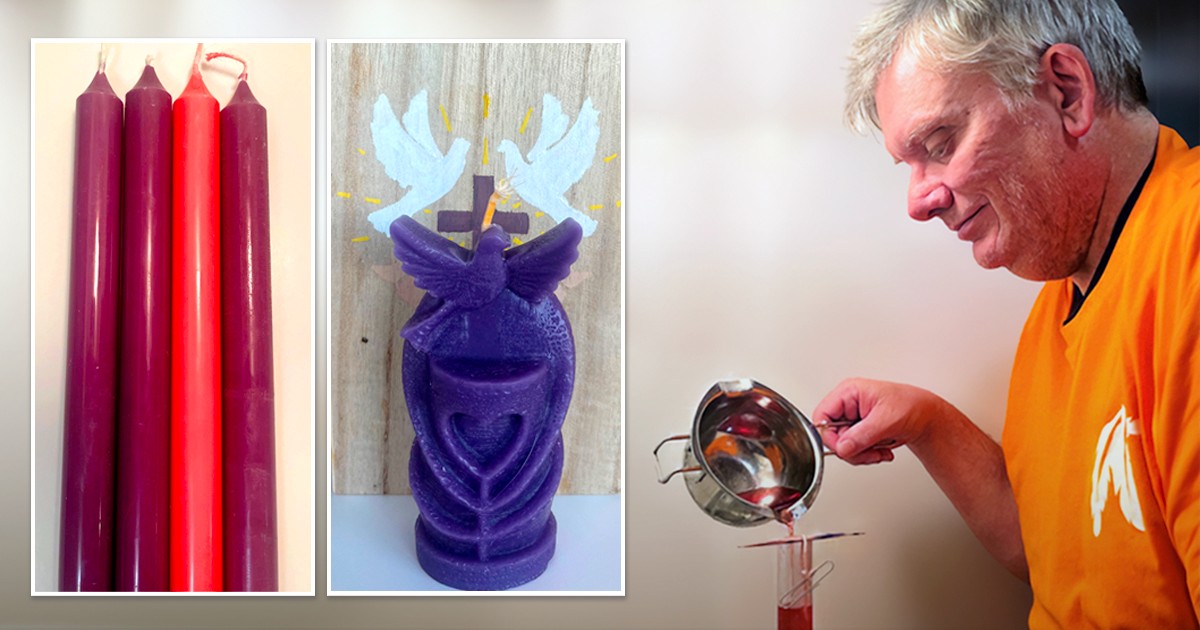(Above) Dani Shaw, director of public affairs, shares her neighbourhood with a drop-in centre for those experiencing homelessness. She met William outside her local grocery store one evening on the way home from work (Photos: Dani Shaw)
"Promise me you will eat this, because I know what it’s like to go hungry.” It was a homeless man who spoke these words to me one evening last September. He was one of the more than 35 new men who moved into our neighbourhood after a 24-7 drop-in centre opened on our street just a few months earlier.
The drop-in centre was met with mixed reactions. Some of my neighbours welcomed the new residents with open arms, care packages and books to help pass the time during Toronto’s first COVID-19 lockdown. Others were angry. Angry that the drop-in centre was located right next to a seniors’ apartment building and across the street from one of the many co-op and subsidized housing buildings in our neighbourhood. Angry that local residents had no input—or warning. Angry that this would affect property values for condo owners, some of whom were already living and raising a family in cramped quarters and hoping to move into a larger house one day.
Although I supported the city’s decision and was confident our neighbourhood would adjust to this new reality, I tried to understand my neighbours’ concerns. I suspect COVID-19 had a particularly noticeable impact on high-density, urban-core neighbourhoods because of the lack of both indoor and outdoor spaces where family members and roommates could get a break from each other or, conversely, gather with neighbours and friends. Within our own building, COVID-19 and related public health measures turned our typically friendly, welcoming and tightknit vertical community into something quite different and almost unrecognizable. Our indoor and outdoor common areas were closed to prevent social gatherings with anyone outside of our immediate household. Taped lines appeared in our lobby and elevators, reminding us to keep our distance. Mask wearing was strongly encouraged inside the building long before the city made it mandatory. The concierge desk and lobby, once the condo equivalent of the office water cooler, were now off limits as casual conversations with our neighbours and building staff were discouraged.
The drop-in centre further disrupted the sense of normalcy. Within days of its opening, men began hanging out near the loading dock behind our building. The dumpster containing cardboard recycling was set on fire one night. Drug dealers and drug paraphernalia began appearing on the sidewalk. Throughout the summer months, it became a regular occurrence to see someone walking down the street yelling and screaming and swearing at passersby—both real and perceived—“for no reason.” In August, my neighbours reported that a woman was assaulted in a local park when she set up a lemonade stand with her two young children. Just before Labour Day, a 71-year-old man who was living in a bus shelter outside the drop-in centre was stabbed. Weeks later, he succumbed to his injuries, while still living in the bus shelter.
There was no hiding or ignoring the reality of poverty, homelessness, addiction or precarious mental health in our neighbourhood. It was out there, on the sidewalk, for all of us to see. Many of the “us” in my neighbourhood did not see “them” as our neighbours.
I juxtapose these events with a conversation I had with a man—whose name I later learned was William—as I stopped by my local grocery store one evening on my way home from work. I was just leaving the store when a man asked if I could spare some change. He had a gentle, childlike demeanour. Given that I almost never carry cash, I apologized and offered to go back into the grocery store to buy him some food. I had done that once before when I saw him outside of my local coffee shop.
We talked about what he would like to eat. At first, he asked for a piece of cake, seemingly not wanting to ask for too much, but maybe just wanting something sweet and decadent. I offered to get him a premade meal from the deli, or some snacks, before we settled on chicken wings. I went back into the store where I managed to get the last five chicken wings they had.
As I headed toward the self-checkout, chicken wings in hand, I texted my husband to tell him it seemed like the entire population of Toronto was at our grocery store. I hadn’t seen lines like that since toilet paper was in short supply. So I waited—probably a good 15-20 minutes.
On exiting the store again, William was sitting outside, with a full roast chicken and a bottle of water in hand. I apologized that it took me so long and attempted to give him the chicken wings, but he told me a nice lady bought him a whole chicken, so he did not need the wings.
Wanting to ensure he had enough to eat, I suggested maybe keeping them for later. But he graciously insisted that I keep them.
As he handed the wings back to me, he said, “Promise me you will eat these. Promise me you will take them with you and eat them yourself.” Then a third time, he said, “Promise me you will eat this, because I know what it’s like to go hungry.”
That moment stuck with me. It stuck with me because William did not see me as “other” than him—as one of the more affluent people whose neighbours protested the opening of his new temporary home. Or as the charitable stranger who, to paraphrase Dr. Aimee Patterson in her recent article in the Salvation Army journal Word and Deed, “did something” for a person we presume can’t do much for themselves. It stuck with me because he didn’t see “us” and “them”—he saw our common humanity and insisted on caring for me. He knew what it was like to go hungry and did not want me to experience it.
I took those chicken wings home and I ate them. I ate them mindfully, thinking about William, whose compassion brought Jesus’ teachings and our shared humanity to life. I thought about the parable of the Good Samaritan—the socially marginalized person who cared for a man found lying and left for dead on the side of the road after more affluent and more highly regarded men passed him by. I thought about the words of Matthew 25:35, “For I was hungry and you gave me something to eat, I was thirsty and you gave me something to drink, I was a stranger and you invited me in.” I thought about William’s gentle, childlike demeanour and the words of Matthew 19:14, “Let the little children come to me, and do not hinder them, for the kingdom of God belongs to such as these.”
My conversation with William reminded me that we share a common humanity, and when we recognize that, we can show concern for our fellow human beings—strangers, friends and neighbours. It reminded me that if we take the time to look for the things we have in common, rather than the things that set us apart, we can love one another as neighbours. We all need food, water, shelter and someone who cares enough to notice us, to stop for a sidewalk chat and ask how we are doing, and to help make our day a little brighter. William’s kindness made my day a little brighter.
William is my neighbour.
Dani Shaw is the director of public affairs.
"Promise me you will eat this, because I know what it’s like to go hungry.” It was a homeless man who spoke these words to me one evening last September. He was one of the more than 35 new men who moved into our neighbourhood after a 24-7 drop-in centre opened on our street just a few months earlier.
The drop-in centre was met with mixed reactions. Some of my neighbours welcomed the new residents with open arms, care packages and books to help pass the time during Toronto’s first COVID-19 lockdown. Others were angry. Angry that the drop-in centre was located right next to a seniors’ apartment building and across the street from one of the many co-op and subsidized housing buildings in our neighbourhood. Angry that local residents had no input—or warning. Angry that this would affect property values for condo owners, some of whom were already living and raising a family in cramped quarters and hoping to move into a larger house one day.
Although I supported the city’s decision and was confident our neighbourhood would adjust to this new reality, I tried to understand my neighbours’ concerns. I suspect COVID-19 had a particularly noticeable impact on high-density, urban-core neighbourhoods because of the lack of both indoor and outdoor spaces where family members and roommates could get a break from each other or, conversely, gather with neighbours and friends. Within our own building, COVID-19 and related public health measures turned our typically friendly, welcoming and tightknit vertical community into something quite different and almost unrecognizable. Our indoor and outdoor common areas were closed to prevent social gatherings with anyone outside of our immediate household. Taped lines appeared in our lobby and elevators, reminding us to keep our distance. Mask wearing was strongly encouraged inside the building long before the city made it mandatory. The concierge desk and lobby, once the condo equivalent of the office water cooler, were now off limits as casual conversations with our neighbours and building staff were discouraged.
There was no hiding or ignoring the reality of poverty, homelessness, addiction or precarious mental health in our neighbourhood.From the moment we opened our apartment door to the moment we exited the building, we were reminded to keep our distance, not touch anything, wash our hands and avoid social interaction with our neighbours. Condo dwellers were already on edge in their own “homes” and physically distanced sidewalk chats on the streets in our neighbourhood became the only opportunity to relax and reclaim some semblance of normalcy and community.
The drop-in centre further disrupted the sense of normalcy. Within days of its opening, men began hanging out near the loading dock behind our building. The dumpster containing cardboard recycling was set on fire one night. Drug dealers and drug paraphernalia began appearing on the sidewalk. Throughout the summer months, it became a regular occurrence to see someone walking down the street yelling and screaming and swearing at passersby—both real and perceived—“for no reason.” In August, my neighbours reported that a woman was assaulted in a local park when she set up a lemonade stand with her two young children. Just before Labour Day, a 71-year-old man who was living in a bus shelter outside the drop-in centre was stabbed. Weeks later, he succumbed to his injuries, while still living in the bus shelter.
There was no hiding or ignoring the reality of poverty, homelessness, addiction or precarious mental health in our neighbourhood. It was out there, on the sidewalk, for all of us to see. Many of the “us” in my neighbourhood did not see “them” as our neighbours.
I juxtapose these events with a conversation I had with a man—whose name I later learned was William—as I stopped by my local grocery store one evening on my way home from work. I was just leaving the store when a man asked if I could spare some change. He had a gentle, childlike demeanour. Given that I almost never carry cash, I apologized and offered to go back into the grocery store to buy him some food. I had done that once before when I saw him outside of my local coffee shop.
We talked about what he would like to eat. At first, he asked for a piece of cake, seemingly not wanting to ask for too much, but maybe just wanting something sweet and decadent. I offered to get him a premade meal from the deli, or some snacks, before we settled on chicken wings. I went back into the store where I managed to get the last five chicken wings they had.
As I headed toward the self-checkout, chicken wings in hand, I texted my husband to tell him it seemed like the entire population of Toronto was at our grocery store. I hadn’t seen lines like that since toilet paper was in short supply. So I waited—probably a good 15-20 minutes.
On exiting the store again, William was sitting outside, with a full roast chicken and a bottle of water in hand. I apologized that it took me so long and attempted to give him the chicken wings, but he told me a nice lady bought him a whole chicken, so he did not need the wings.
Wanting to ensure he had enough to eat, I suggested maybe keeping them for later. But he graciously insisted that I keep them.
As he handed the wings back to me, he said, “Promise me you will eat these. Promise me you will take them with you and eat them yourself.” Then a third time, he said, “Promise me you will eat this, because I know what it’s like to go hungry.”
That moment stuck with me. It stuck with me because William did not see me as “other” than him—as one of the more affluent people whose neighbours protested the opening of his new temporary home. Or as the charitable stranger who, to paraphrase Dr. Aimee Patterson in her recent article in the Salvation Army journal Word and Deed, “did something” for a person we presume can’t do much for themselves. It stuck with me because he didn’t see “us” and “them”—he saw our common humanity and insisted on caring for me. He knew what it was like to go hungry and did not want me to experience it.
I took those chicken wings home and I ate them. I ate them mindfully, thinking about William, whose compassion brought Jesus’ teachings and our shared humanity to life. I thought about the parable of the Good Samaritan—the socially marginalized person who cared for a man found lying and left for dead on the side of the road after more affluent and more highly regarded men passed him by. I thought about the words of Matthew 25:35, “For I was hungry and you gave me something to eat, I was thirsty and you gave me something to drink, I was a stranger and you invited me in.” I thought about William’s gentle, childlike demeanour and the words of Matthew 19:14, “Let the little children come to me, and do not hinder them, for the kingdom of God belongs to such as these.”
My conversation with William reminded me that we share a common humanity, and when we recognize that, we can show concern for our fellow human beings—strangers, friends and neighbours. It reminded me that if we take the time to look for the things we have in common, rather than the things that set us apart, we can love one another as neighbours. We all need food, water, shelter and someone who cares enough to notice us, to stop for a sidewalk chat and ask how we are doing, and to help make our day a little brighter. William’s kindness made my day a little brighter.
William is my neighbour.
Dani Shaw is the director of public affairs.










Comment
On Friday, March 26, 2021, Christine LeBlanc said:
On Thursday, March 25, 2021, Ray Harris said:
On Friday, March 19, 2021, Dan Millar said:
On Thursday, March 18, 2021, Jean Moulton said:
Leave a Comment